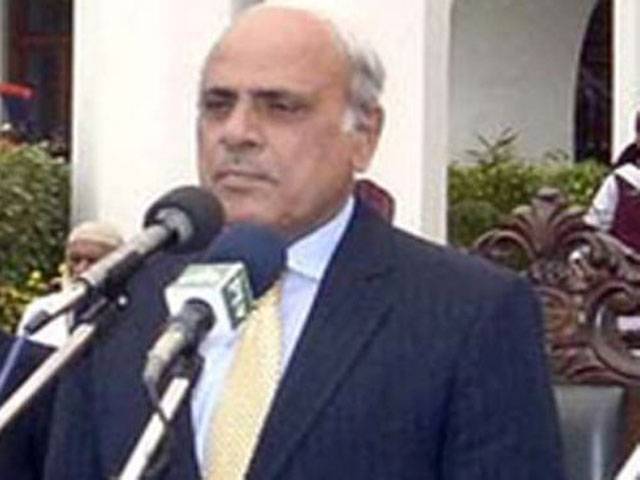Lahore - Punjab Governor Malik Rafique Rajwana on Friday emphasized the need for providing an enabling environment and confidence to the prospective investors in the local economy.
He was addressing the inaugural ceremony of 2 days international SAFA Conference 2016. The Conference ‘South Asia: Corridor of Opportunities’ is being organized by the Institute of Chartered Accountants of Pakistan (ICAP) and South Asian Federation of Accountants (SAFA) in Lahore from January 29-30.
‘With globalization and constant changes in the world’s economy, the organization of such a gathering for exchange of views is the need of the day for future progress and success,’ added Governor Punjab.
He hoped that this conference will provide a unique opportunity to renowned professionals and experts from around the region to discuss and debate the emerging economic problems faced by the world, particularly the region, and deliberate on possible solutions to the serious issues.
‘Accountants can play a very effective role through their professional expertise in further improving the investment climate in the country. Although significant improvements have been made in financial and related disclosures, public trust in the work of professional accountants has to be further enhanced,’ he added.
Meanwhile, Ahsan Iqbal, Minister for Planning, Development & Reform speaking on the occasion stated that the theme of Conference, South Asia: Corridor of Opportunities is quite appropriate in the context of new challenges being faced by the region’s industry and economy.
‘I am sure that the Conference in its technical sessions will deliberate on issues of sustainable regional development and would redefine the role of accounting professionals towards meeting challenges and utilizing opportunities that would lead to sustainable economic development in the country. Professional accountants must take the lead in ensuring the quality, reliability, and credibility of financial and non-financial management information to build up public confidence,’ added Mr. Ahsan.
President SAFA Sheikh Naeem Akhtar also spoke on the occasion. He said the role of the accounting profession in a developing country is far more crucial and challenging than in a developed nation because of a series of problems - like lack of resources, heavy borrowing, and unplanned investment, high level of development expenditure and above all, lack of accountability.
‘It is the responsibility of the profession to strive hard to provide order in this state of chaos and confusion. It has to provide systems, standards, procedures, tools and training to ensure transparency and accountability, ethical practices, corporate governance leading to a robust economic system and growth,’ added Naeem.
He said a forum of highly competent professionals like ICAP has a significant role in leading the country towards development and out of economic dependence by providing assurance on financial reports, which are vital to the functioning of capital and credit markets and in helping to ensure the efficient use of public funds and resources besides other valuable services to the public and private sectors.
President ICAP Hafiz Mohammad Yousaf in his speech said the topic of this conference is extremely significant today and vital for the long term survival of the economies of the region and the accounting profession.
‘South Asia’s diversity provides huge opportunities for trade, investment, and economic growth, as the region’s remarkable success in recent decades shows. Its economies have flourished, becoming more closely intertwined with each other and the rest of the world,’ said Yousaf.
Economic integration between South and East Asian countries is set to gain momentum, said President ICAP, adding that this will encourage enhanced cooperation between the two regions if the regional economy is adequately supported by cross-border infrastructure facilities, both hardware and software.
‘A well planned regional infrastructure would not only reduce trade costs, but also encourage efficiency-seeking industrial restructuring. On the one hand, developing economic corridors are meant to fill regional infrastructure gaps, and, on the other, promote pro-poor socioeconomic development. They help increase trade flows, create employment, and reduce poverty,’ reasoned Yousaf.
He stated that economic corridors primarily take advantage of under-utilized potential to ensure effective integration between industry and infrastructure. ‘This is a prerequisite for attracting investments into export-oriented industries and manufacturing, which leads to economic and social development,’ he added.
Thursday, April 18, 2024
Punjab governor stresses govt resolve to boost economy
SAFA Conference 2016 opens

FJWU hosts world moot on educational innovations
April 18, 2024
PPP, PML-N parliamentary delegation in Beijing to boost ties
April 18, 2024
Eight more Sindh ministers sworn in
April 18, 2024
AGP’s audit report discloses irregularities in BRT project
April 18, 2024
Hepatitis Challenge
April 18, 2024
IMF Predictions
April 18, 2024
Wheat War
April 18, 2024
Rail Revival
April 17, 2024
Addressing Climate Change
April 17, 2024
Justice denied
April 18, 2024
AI dilemmas unveiled
April 18, 2024
Tax tangle
April 18, 2024
Workforce inequality
April 17, 2024
New partnerships
April 17, 2024
ePaper - Nawaiwaqt
Advertisement
Nawaiwaqt Group | Copyright © 2024





